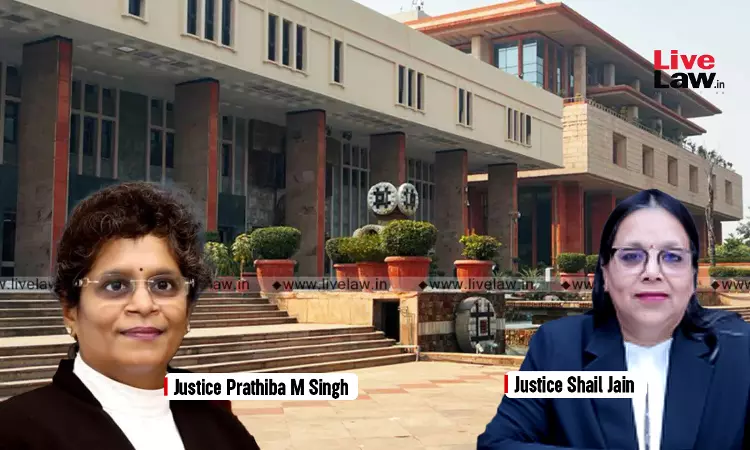- Home
- /
- High Courts
- /
- Delhi High Court
- /
- CCTV Footage Of Assessee's Family...
CCTV Footage Of Assessee's Family Cannot Be Used By GST Dept, Violates Right To Privacy: Delhi High Court
Mehak Dhiman
22 Sept 2025 7:43 PM IST
The Delhi High Court has issued directions safeguarding the right to privacy in GST search proceedings, stating that any family-related CCTV footage which violates the privacy of family members cannot be used or disseminated in any manner. “Some of the concerns which are raised by the Petitioners such as right to privacy of the family being violated, etc., deserve to be...
The Delhi High Court has issued directions safeguarding the right to privacy in GST search proceedings, stating that any family-related CCTV footage which violates the privacy of family members cannot be used or disseminated in any manner.
“Some of the concerns which are raised by the Petitioners such as right to privacy of the family being violated, etc., deserve to be addressed. Clearly, any family-related CCTV footage which is with the GST department and violates the privacy of family members cannot be used or disseminated in any manner,” stated the bench consists of Justices Prathiba M. Singh and Shail Jain.
The case of the assessee/Petitioners is that an unauthorised search was conducted by the officials of the CGST Department, wherein the residential premises of the Gumber Family were raided and a large number of electronic gadgets, documents and devices were seized.
The petition was preferred by the assessee, being aggrieved by the various infractions of the GST Department during the said search and seizure.
As per the assessee, the seizure of the CCTV footage from the residence severely violates the right to privacy of the assessee, as the residence from which the CCTV footage was seized has various family members of the Gumber family residing therein.
The department argued that, insofar as violation of privacy is concerned, there is no apprehension, since the hard drive of the CCTV and the memory cards which are set out in the panchnama drawn at the resident premises, (first panchnama') have not been opened by the GST Department, and the same would not be opened without following the proper Standard Operating Procedure (`SOP').
The bench found that the safeguards and conditions under the Code of Criminal Procedure, 1973, (now BNSS, 2023), which apply to search and seizure, would also apply. If the proper Officer has 'reasons to believe' that there is evasion or, an attempt to evade, reasons shall be recorded for retaining the seized goods or other things including documents, and a receipt of the same shall also be executed.
The bench noted that a maze of entities has been created by the Gumber family, which necessitated the inspection, search and seizure. Prima facie, in the background of the facts captured in the note, of the different entities, it cannot be held that the proceedings conducted under Section 67 of the Act were violative or contrary to law.
The bench issued directions to safeguard the right to privacy of the assessee, a few of which are as follows:
Manner in which the CCTV footage is to be copied
- Insofar as the CCTV footage of the residence is concerned, the hard disk, or any memory cards, which contain the CCTV footage of the residential premises, would not be accessed by the officials of the GST Department, except, in the presence of at least one member of the Gumber family, and one authorised representative.
- After viewing the footage in their presence, if there is any relevant data that is required by the GST Department, only to that extent, the same would be copied. All the remaining footage would be returned to the Petitioners.
Communications with persons under investigation
The Court has also perused the Email, and Whatsapp chats sequence, which have been placed on record.
- Email Communication: All communications by the officials of the GST department, with the person/s or entities being investigated ought to be in the official prescribed mode. Whenever emails are sent, the name, and designation of the official ought to be mentioned, so that it can be properly traced back to the person who has sent the email.
- Whatsapp Communication: Insofar as the Whatsapp communication is concerned, the same would not be usually permissible, unless there is an exceptional circumstance, or an emergency. Engaging in such Whatsapp communication, may, in fact, make the officials of the GST Department subject to various allegations, which ought to be avoided.
In view of the above, the bench disposed of the petition.
Case Title: Genesis Enterprises v. Principal Commissioner CGST Delhi East
Citation: 2025 LiveLaw (Del) 1160
Case Number: W.P.(C) 13821/2025
Counsel for Petitioner/Assessee: Mr. Bharat Bhushan, Ms. Nidhi Gupta, and Mr. Anunay Mishra
Counsel for Respondent/Department: Mr. Arun Khatri, SSC and Mr. Akash Panwar, JSC with Ms. Anoushka Bhalla, Ms. Tracy Sebastian, Mr. Sahil Khurana, Mr. Akshay, Mr. Hitesh Nandal, Mr. Pranav, Ms. Shelley



